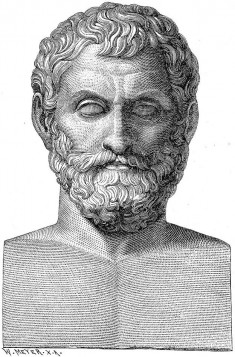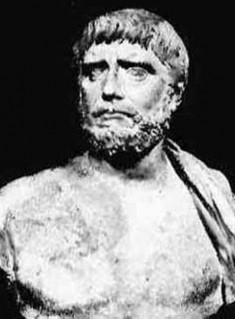| Thales | |
|---|---|
 |
|
| Mathematician & Philosopher | |
| Specialty | Ethics, metaphysics, mathematics, astronomy |
| Born | c. 624 BC |
| Died | c. 547–546 BC |
| Nationality | Greek |
Thales was born more than 600 years before the birth of Christ. He entered life steeped in a culture defined by ancient mythologies. But it is Thales who is said to be among the first to toss aside centuries of nonscientific belief systems. Instead, he attempted to explain physical reality in terms of objective observation, measuring, testing and by developing solid mathematics.
Early Years of Thales
It is believed that Thales was born around the year 624 B.C. in the Ionian city of Miletus, which today is located on the western coast of Turkey. Because of the vast timescale, specific details of just where or when Thales was born are sketchy. Some ancient sources name his parents as Examyes and Cleobuline. It is possible and likely that his family was of the higher class, and perhaps even wealthy merchants. Some have traced the family of Thales back to an important Phoenician prince.
It must be acknowledged, however, that it is possible that Thales was born in Athens and later migrated to Miletus. That is because Thales is often considered to have been the “first Sage” of the famous Seven Sages. This was a school of elite philosophers known to have been established in Athens in the time period attributed to the life of Thales.
Thales the Philosopher
Up until the time of Thales, it was common for the ancient Greeks to explain natural phenomenon in terms of “actions of gods.” For example, a thunder storm might be attributed to the anger of Zeus, or an earthquake as the workings of the gods of the underworld.
But Thales was bold enough to go beyond this way of thinking in favor of more logical and rational explanations. As for earthquakes, for example, Thales proposed that the Earth’s landmasses are afloat on oceans, and so the violent action of waves might be the true cause of a shaking earth.
Contributions to Mathematics
The importance of Thales’ contributions to the understanding of mathematics cannot be overemphasized. His theoretical work in the field of geometry would have enormous influence on all western science that followed. Thales came before Euclid, after whom Euclidean Geometry is named. But without Thales, there may have never been a Euclid.
 Thales is said to have been the first to describe the underlying principles of bisecting circles, and he may have been the first to demonstrate mathematically that the angles at the base of an isosceles triangle are equal. Thales also showed that triangles having two angles and one side equal share equality. This was more than just lofty theory since these principles could be used for practical purposes, such as finding the distance of ships at sea.
Thales is said to have been the first to describe the underlying principles of bisecting circles, and he may have been the first to demonstrate mathematically that the angles at the base of an isosceles triangle are equal. Thales also showed that triangles having two angles and one side equal share equality. This was more than just lofty theory since these principles could be used for practical purposes, such as finding the distance of ships at sea.
Without these kinds of fundamental understandings of geometry, so much of what we take for granted today would be impossible. The mathematical developments of Thales spurred forward a variety of practical disciplines, from navigation and architecture to engineering and a deeper understanding of astronomy.
Thales is famous for an important theorem that is named after him. The Thales Theorem states: “If A, B and C are points on a circle where the line AC is a diameter of the circle, then the angle ABC is a right angle.”
Thales and Materialism
The greatest philosophers of modern times have debated the influence of Thales with enthusiasm, but also considerable disagreement. Many point to Thales as the man who gave birth to materialism — the idea that our reality is made of something “solid.” This takes the fundamentals of physics out of the realm of mysticism or supernatural explanations and into “hard reality.”
Thales is also considered to be among the first “Naturalists,” meaning that he basically attempted to explain “nature with nature itself.” That is, rather than attributing the creation of water, rocks or trees to gods traditionally assigned to each of those, Thales sought to look at everything in terms of what the fundamental properties of substances are rather than overlaying it with a reference to a nonphysical or transcendent source.
As such, Thales was among the first to make a major break with traditional ways of thinking that had held sway for several centuries. That makes him a significant and important figure in world history.